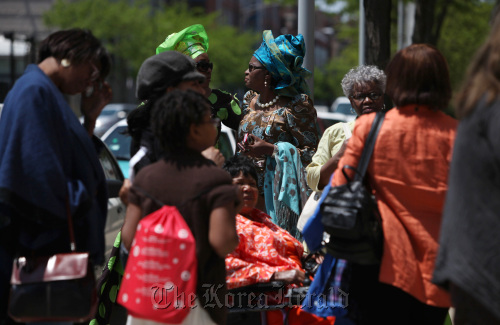LOS ANGELES ― What can you say about the last days of “The Oprah Winfrey Show” when it’s all been said already. And mostly by Oprah herself.
According to audience members interviewed by the Chicago Tribune after its taping, Wednesday’s finale will be a farewell address by the most famous talk show host in history, a summing up of a 25-year career in her own words.
Because in case you hadn’t gotten the message, nobody does it like Oprah, even if the “it” refers to defining her own legacy. This is not something you can just leave to chance, or worst, other members of the media. “Twenty-five years you have given us of you,” said Jada Pinkett Smith on Tuesday at the beginning of the second hour of “Surprise Oprah! A Farewell Spectacular.” “You have enlightened us, you have empowered us and you have taught us how to be.”
Taught us how to be. Not sure what that means, but it seems to cover all the bases.
More than anyone, Oprah Winfrey knows how to cover all the bases. For more than two decades, she controlled not just five hours of television each week, large swaths of the publishing industry, the economic future of innumerable gurus, performers and luxury product manufacturers, she also increasingly controlled any possible ancillary coverage of it all.
She didn’t give many interviews because if you didn’t get it all on the show, well, she had her own magazine and if you had any further questions, they could be answered by her website. Jerry Seinfeld may have riffed about men learning how to talk by pretending to be on “Oprah” ― smile, nod and answer the questions ― but you did not find Oprah facing questions from her fellow hosts, and you likely never will.
 |
A handful of Oprah Winfrey fans stand outside her studio, hoping to get in for the last day of taping in Chicago, Illinois on May 24. (MCT) |
So the final days of “The Oprah Winfrey Show” were essentially a pumped-up version of the many days that preceded them ― Oprah sharing the people, places and things that move her and explaining why. She apologized to James Frey for a lack of compassion, confessed to Ralph Lauren (three times!) that she had often driven past his Colorado spread enviously counting the mileage of his fence line. She brought out guests of heart-wringing past, including her Very Favorite, a woman from Zimbabwe who overcame abject poverty and an abusive early marriage to move to the United States and become a doctor.
Then she allowed her staff to throw her a two-hour surprise party during which she basked in the high-wattage praise delivered by a Whitman sampler of A-listers, an original Oprah poem by Maya Angelou and the song stylings of stars including Beyonce, Josh Groban, Stevie Wonder, Jamie Foxx, Aretha Franklin and, heaven help us, Rosie O’Donnell.
It was so beyond spectacle that one wondered why foreign cities had not bid for the rights, why a special Oprah pavilion had not been erected and where, exactly, Chicago planned to put its new eternal flame.
And yet.
And yet amid all the extravaganza insanity, Oprah managed to remind us why all this was happening. On the second day, after she had deconstructed the whole “A Million Little Pieces” incident into just that, she asked Frey about the death of his infant son. During the heartbreaking story, Frey told Oprah that the time he spent under her lash was not his worst day, it wasn’t even in the top 200. “The day your son dies,” he said, “is a bad day.” In the grand scheme of things, he was saying to the queen of the world on her biggest week ever, you and your show don’t matter so much.
And Oprah, to her absolute and admirable credit, let the moment hang there, unmolested and unembellished by anything beyond a nod and a sympathetic murmur.
Then, of course, they both went back to selling things ― she her compassion, he his new book ― but it didn’t matter. For a few astonishing minutes, crazy and amazing truth had bloomed. Oprah had given James Frey two of her final eight days so he could tell her that she did not make his top 200. And she aired the sucker anyway.
It happened again with Jacqueline Saburido, a woman whose face and body had been badly burned in a car fire. When she joined Oprah in 2003, four years after her accident, Saburido was a symbol of inner beauty triumphant.
On Friday’s show, she was anything but. Mired in severe depression, she was unable to remember her past self or her future dreams because they didn’t matter “when you can’t do anything.” When Oprah reminded her of how brave and admirable she was, Saburido shrugged. “I had an accident and people seem to like me,” she said. “I really don’t know why.”
Again, a moment of unvarnished reality ― lives continue outside the warmth of the Harpo studio and they do not always go well despite the admiration of Oprah ― amid all the inspiration and yet there it was, with just two days left before the finale.
That is the real legacy of Oprah Winfrey ― her instinctive understanding of storytelling on television. For all her control issues and narrative insistence, Oprah understands that moments of truth and beauty are never scripted, that they exist mostly in the blank spaces between the items on the checklist, come up through the cracks in a conversation, rarely look anything like you thought they would.
And when they emerge, no matter what else is going on, it is best to sit still and let them be. You can sell stuff after the commercial break.
By Mary McNamara
(Los Angeles Times)
(McClatchy-Tribune Information Services)








![[Today’s K-pop] Blackpink’s Jennie, Lisa invited to Coachella as solo acts](http://res.heraldm.com/phpwas/restmb_idxmake.php?idx=644&simg=/content/image/2024/11/21/20241121050099_0.jpg)